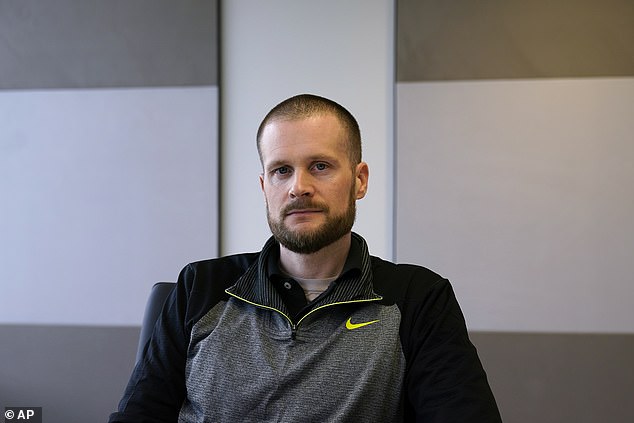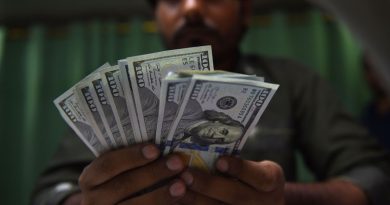Blackwater contractor pardoned by Trump for Baghdad shooting rampage insists he acted correctly
One of the four former Blackwater contractors pardoned by President Donald Trump for his role in a Baghdad shooting rampage has defended his actions in the incident, as the FBI agent who investigated the case calls it a ‘massacre’ and UN experts claim the pardons violate international law.
Evan Liberty was convicted of voluntary and attempted manslaughter in the 2007 incident in which U.S. contractors opened fire in busy traffic in Baghdad’s Nisour Square and killed 14 unarmed Iraqi civilians.
‘I feel like I acted correctly,’ Liberty said of his conduct in 2007, in his first interview after his release. ‘I regret any innocent loss of life, but I’m just confident in how I acted and I can basically feel peace with that.’
The Blackwater rampage marked one of the darkest chapters of the Iraq war, staining the U.S. government reputation and prompting an international outcry about the role of contractors in military zones.
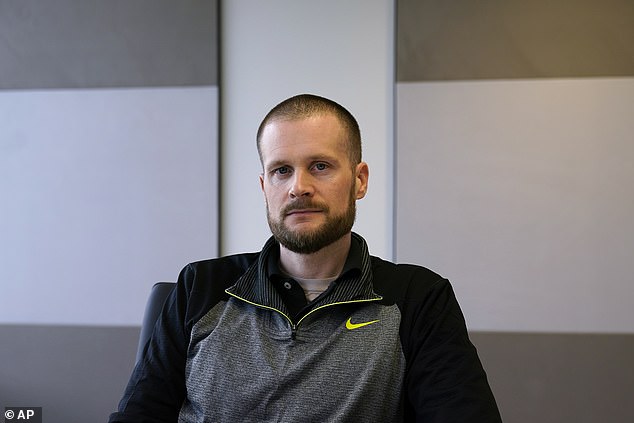
Evan Liberty was convicted of voluntary and attempted manslaughter in the 2007 incident in Baghdad’s Nisour Square, and says after being pardoned: ‘I feel like I acted correctly’
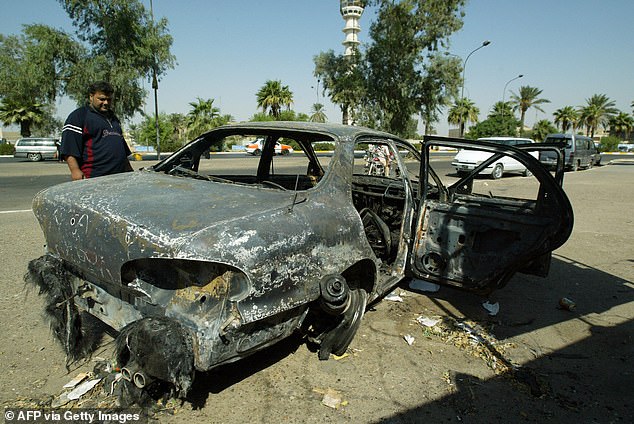
An Iraqi looks September 2007, at a burnt car on the site where Blackwater guards who were escorting US embassy officials opened fire in western Baghdad
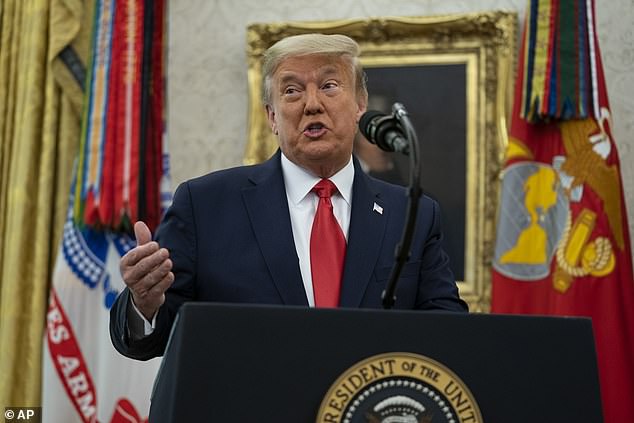
Trump pardoned the four former Blackwater guards on December 22, 2020
In a letter to the New York Times, the retired FBI agent who investigated the case, John M. Patarini, blasted the pardons and called the shooting ‘a massacre along the lines of My Lai in Vietnam.’
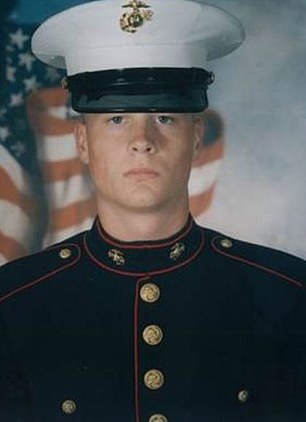
Liberty enlisted in the Marines at age 17 and later worked for contractor Blackwater
‘President Trump should have had staff members review the trial evidence that led to the convictions and read the judges’ opinions and sentencing statements,’ he wrote. ‘I’m so disgusted with the president’s actions!’
‘I’m so glad that I’m retired and will never again be asked to risk my life and those of my fellow investigators, only to have killers pardoned for purely political reasons,’ he continued.
The My Lai massacre occurred in 1968, when U.S. soldiers killed hundreds of unarmed South Vietnamese civilians, including women and young children.
After a monthslong trial in 2014, a jury convicted the four Blackwater guards in the deaths of 14 civilians and of injuring even more. A judge called the shootings an ‘overall wild thing’ that cannot be condoned.
Nicholas Slatten was convicted of first-degree murder in the shooting, while Paul Slough, Liberty and Dustin Heard were convicted of voluntary and attempted manslaughter. They were serving sentences ranging from about 15 years to life before Trump pardoned them in a pre-Christmas clemency spree.
The guards have long maintained they were targeted by insurgent gunfire at the traffic circle where the shooting occurred.
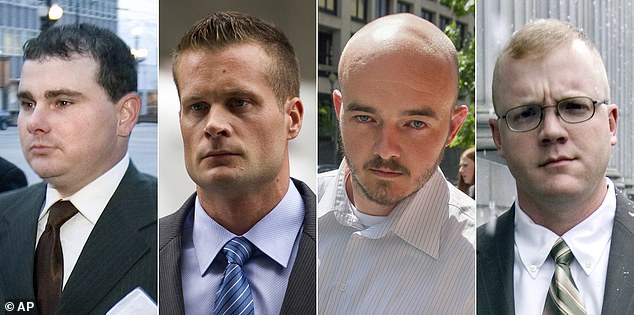
Convicted in the shooting rampage were: Dustin Heard, Evan Liberty, Nicholas Slatten and Paul Slough. Trump pardoned the four guards on December 22
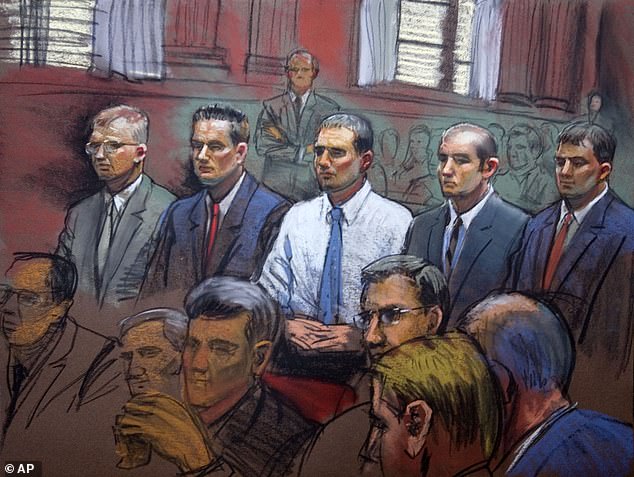
Blackwater Worldwide security guards Paul Slough, Evan Liberty, Donald Ball, Nick Slatten and Dustin Heard appear in federal court with their attorneys in 2008
Prosecutors argued there was no evidence to support that claim, noting that many victims were shot while in their cars or while taking shelter or trying to flee.
Trump’s pardon of the four guard violated U.S. obligations under international law, U.N. human rights experts said on Wednesday.
‘Pardoning the Blackwater contractors is an affront to justice and to the victims of the Nisour Square massacre and their families,’ said Jelena Aparac, chair of the U.N. working group on the use of mercenaries, said in a statement.
The Geneva Conventions oblige states to hold war criminals accountable for their crimes, even when they act as private security contractors, the U.N. experts said.
‘These pardons violate U.S. obligations under international law and more broadly undermine humanitarian law and human rights at a global level.’
By allowing private security contractors to ‘operate with impunity in armed conflicts’, states will be emboldened to circumvent their obligations under humanitarian law, they said.
Liberty said he understands many may view him undeserving of clemency but attributes it to what he insists is a misguided narrative of the shooting. In the interview, he maintained that he did not shoot in the direction of any of the victims. ‘I didn’t shoot at anybody that wasn´t shooting at me,’ he said.
He said he and the others would ‘never take an innocent life. We responded to a threat accordingly.’
Liberty, whose 30-year sentence was cut by roughly half last year, isn’t certain how he came to be pardoned and said he has not spoken with Trump. But the group does have supporters, some with ties to the White House.
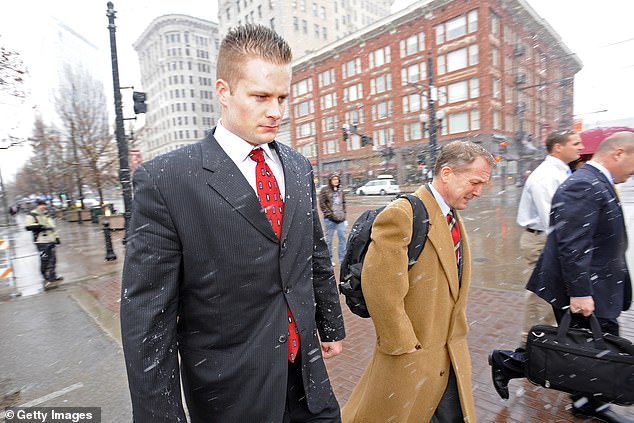
Former Blackwater Worldwide employee Evan Shawn Liberty, 26, a former Marine from Rochester, N.H. leaves federal court December 8, 2008 in Salt Lake City, Utah

Erik Prince, chairman of the Prince Group, LLC and Blackwater USA, holds up a picture showing the affect of a car bomb while testifying on Capitol Hill October 2, 2007
The Blackwater firm, whose name has since changed, was founded by former Navy SEAL Erik Prince, a Trump ally whose sister, Betsy DeVos, is education secretary. Their cause also was championed by Fox News personality Pete Hegseth, an Army veteran.
In a statement announcing the pardons, the White House said the move was ‘broadly supported by the public’ and backed by a number of Republican lawmakers.
Trump’s approach to pardons have been heavily influenced by personal appeals from allies.
Throughout his presidency, including in his most recent round of pardons, he’s cleared the convictions of his political backers, including former campaign chairman Paul Manafort and a pair of Republican congressmen who were early supporters of his 2016 campaign.
Trump has also shown a willingness to intervene on behalf of service members accused of war crimes.
In announcing the Blackwater pardons, the White House cited the men’s military service, the support they received and the tangled history of a case that zigzagged for years in Washington’s federal court, turning on radically different interpretations of the shooting.
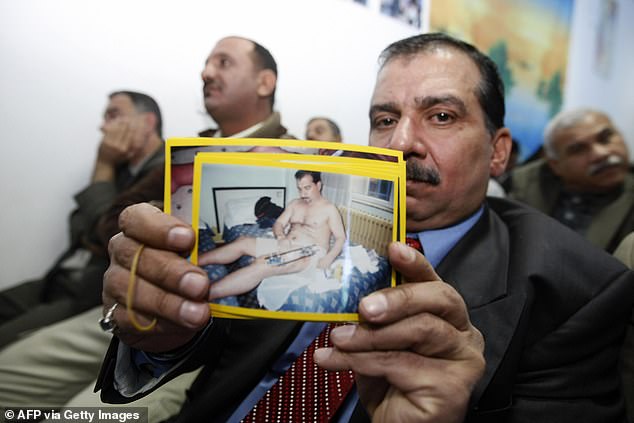
An Iraqi victim of the shooting incident holds up a picture of himself, during a meeting with US Federal Prosecutors to discuss the case against the security firm Blackwater
Criticism was swift. A Washington Post editorial called the pardons a ‘unique threat to national security’ and suggested the guards had committed ‘astonishing acts of inhumanity.’
Iraqi citizens described old wounds being reopened. Soon after the announcement, a photograph of a 9-year-old victim in a blue-patterned shirt smiling faintly circulated widely
online. The boy’s father told the BBC that Trump ‘broke my life again.’
‘They haven’t denied doing what they did,’ said Paul Dickinson, who represented victims in a lawsuit over the shootings. ‘They haven’t apologized for what they did. They haven´t admitted any wrongdoing in what they did.’
Blackwater guards, who as State Department contractors were responsible for providing diplomatic security, were already seen as operating with impunity in Iraq. The rampage further escalated international scrutiny of them, prompted multiple investigations and strained U.S.-Iraqi relations.
How the shooting rampage unfolded
On September 16, 2007, the guards were summoned to create an evacuation route for a diplomat after a car bomb explosion.
By prosecutors’ account, the shooting began after the guards’ four-vehicle convoy took up positions at Baghdad’s crowded Nisour Square, where the contractors launched an unprovoked attack using sniper fire, machine guns and grenade launchers.
Liberty says he shot only in the direction of an Iraqi police post; the guards had been concerned by infiltration by insurgents of police ranks. Prosecutors say he and the others fired indiscriminately.
Defense lawyers say the shooting began only after a white Kia broke from the traffic and moved toward the convoy in ways the guards perceived as a threat and a potential car bomb. In a narrative disputed by prosecutors, the guards say they responded to insurgent gunfire.
One contractor who received immunity described hearing the incoming ‘pop’ of what sounded like AK-47 rounds shortly before another guard fired.
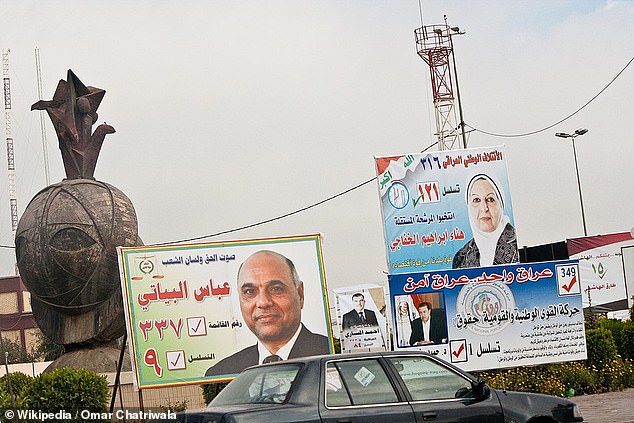
A file photos shows Nisour Square in 2010. The square was the scene of a shooting rampage
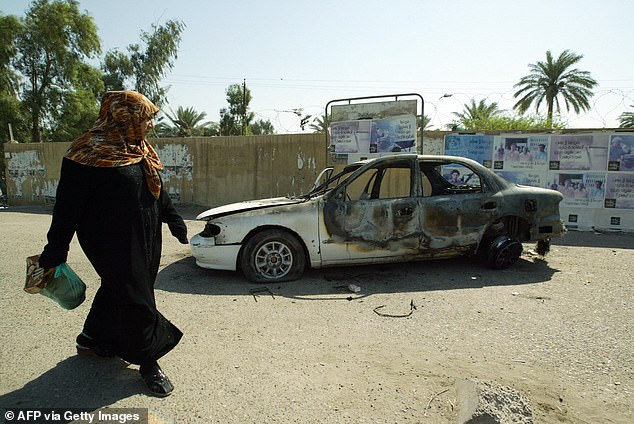
An Iraqi woman walks past a burnt car on the site where Blackwater guards who were escorting US embassy officials opened fire in the western Baghdad neighborhood of Yarmukh
The case was bitterly contested for more than a decade, with the Justice Department reviving the prosecution after an original indictment was thrown out because of government missteps and flying in dozens of Iraqi witnesses to testify.
Liberty and two others, Paul Slough and Dustin Heard, were convicted of manslaughter. Another, Nicholas Slatten, was convicted of first-degree murder.
A fifth guard, Jeremy Ridgeway, pleaded guilty and testified against the others, admitting firing multiple rounds into the Kia – which actually contained a medical student and his mother – but denied that he saw Iraqis pointing guns or that he felt threatened.
Defense lawyers sought to undercut his credibility by noting that he’d previously told a different story.
The lawyers challenged the verdict, citing in part newly discovered evidence – an Iraqi witness statement – they said contradicted what the jury was told.
Slatten’s murder conviction was overturned but he was retried and convicted. The 30-year sentences for the others were shortened after a federal appeals court said the punishments were excessive even though what happened ‘defies civilized description.’
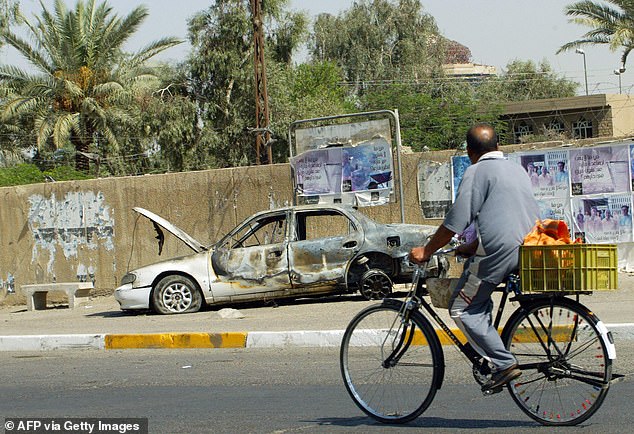
An Iraqi man rides a bicycle passing by remains of a car in Baghdad. The car was burnt during the incident when Blackwater guards escorting US embassy officials opened fire in 2007
After six years behind bars, Liberty had tried to not get his hopes up about a pardon.
Last month, he was reading in the top bunk of his cell one evening late last month when a prison supervisor delivered news he had hoped for.
‘He says, `Are you ready for this?” Liberty recalled. ‘I said, `Uh, I’m not sure. What is going on?´ He said, `Presidential pardon. Pack your stuff.´’
‘Dumbfounded’ when the news came, he grabbed a photograph of his grandfather, a list of Spanish vocabulary he’d been studying and a motivational book on discipline, leaving the rest behind.
The New Hampshire native and Marine veteran said he is uncertain of future plans, though he’s passionate about physical fitness and interested in helping veterans´ organizations.
He says he’s grateful to his supporters and to Trump for what he calls a ‘second chance at life.’
‘I feel like it’s my duty to go out and do something positive and live a good life because they gave me a second chance, so that´s basically my goal.’

